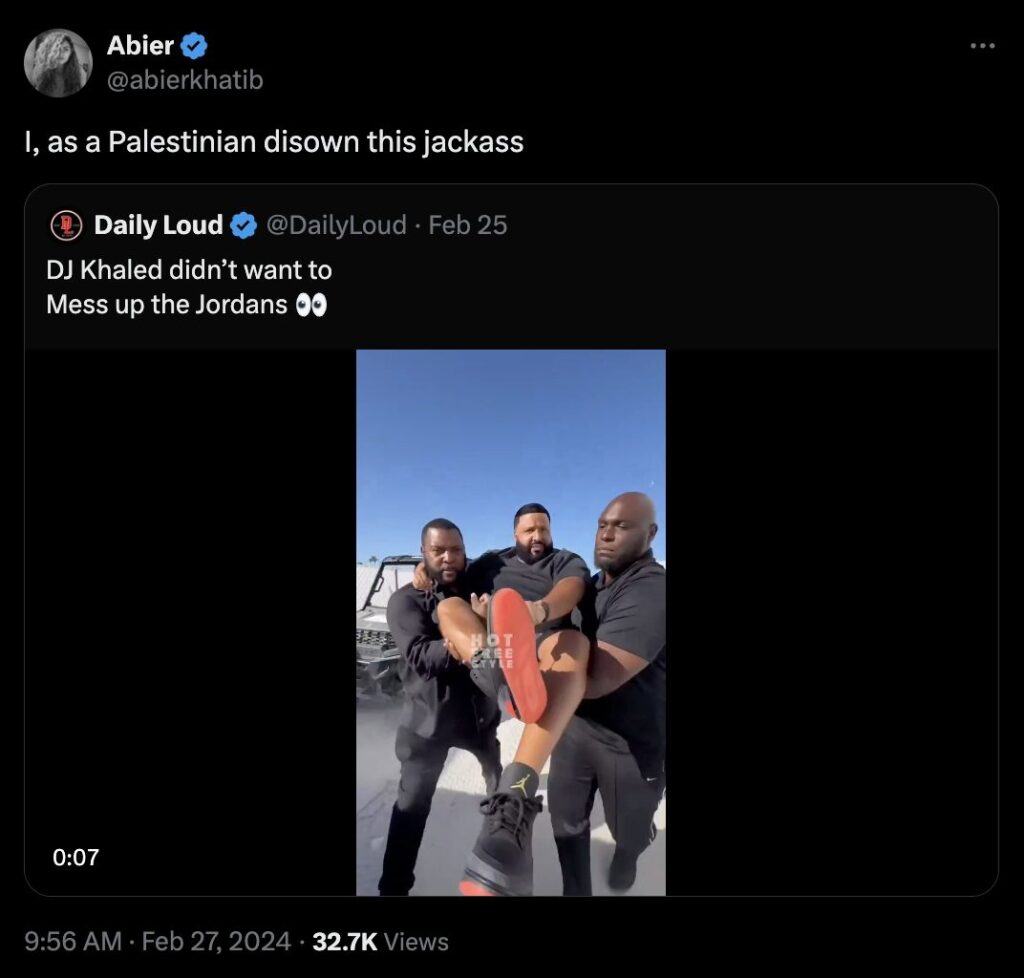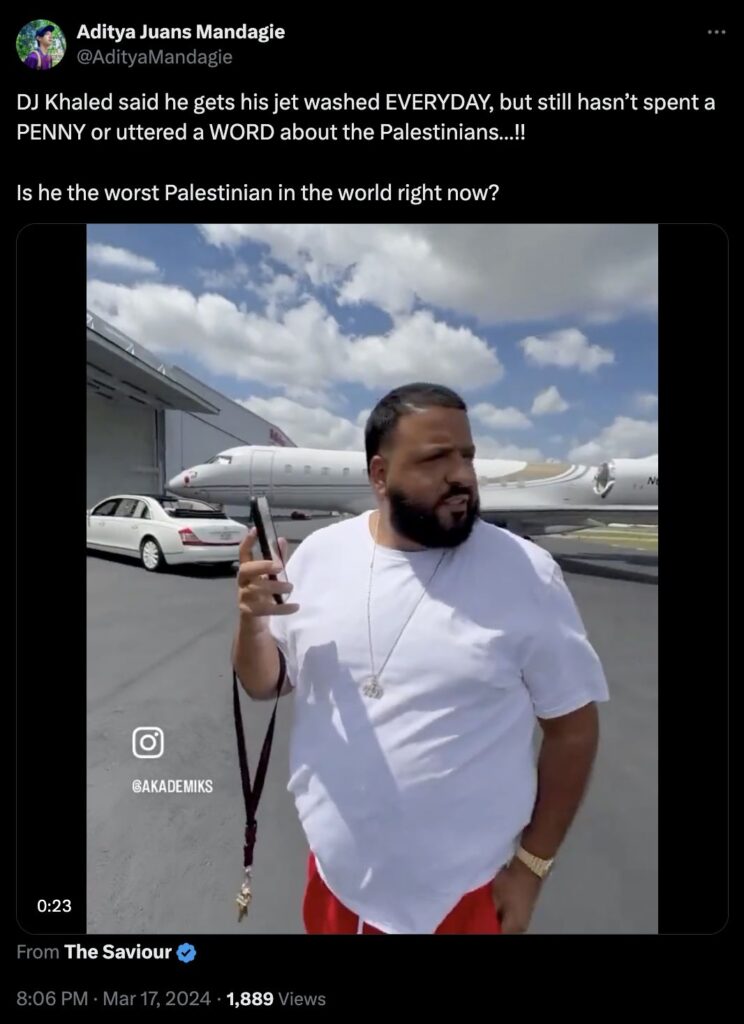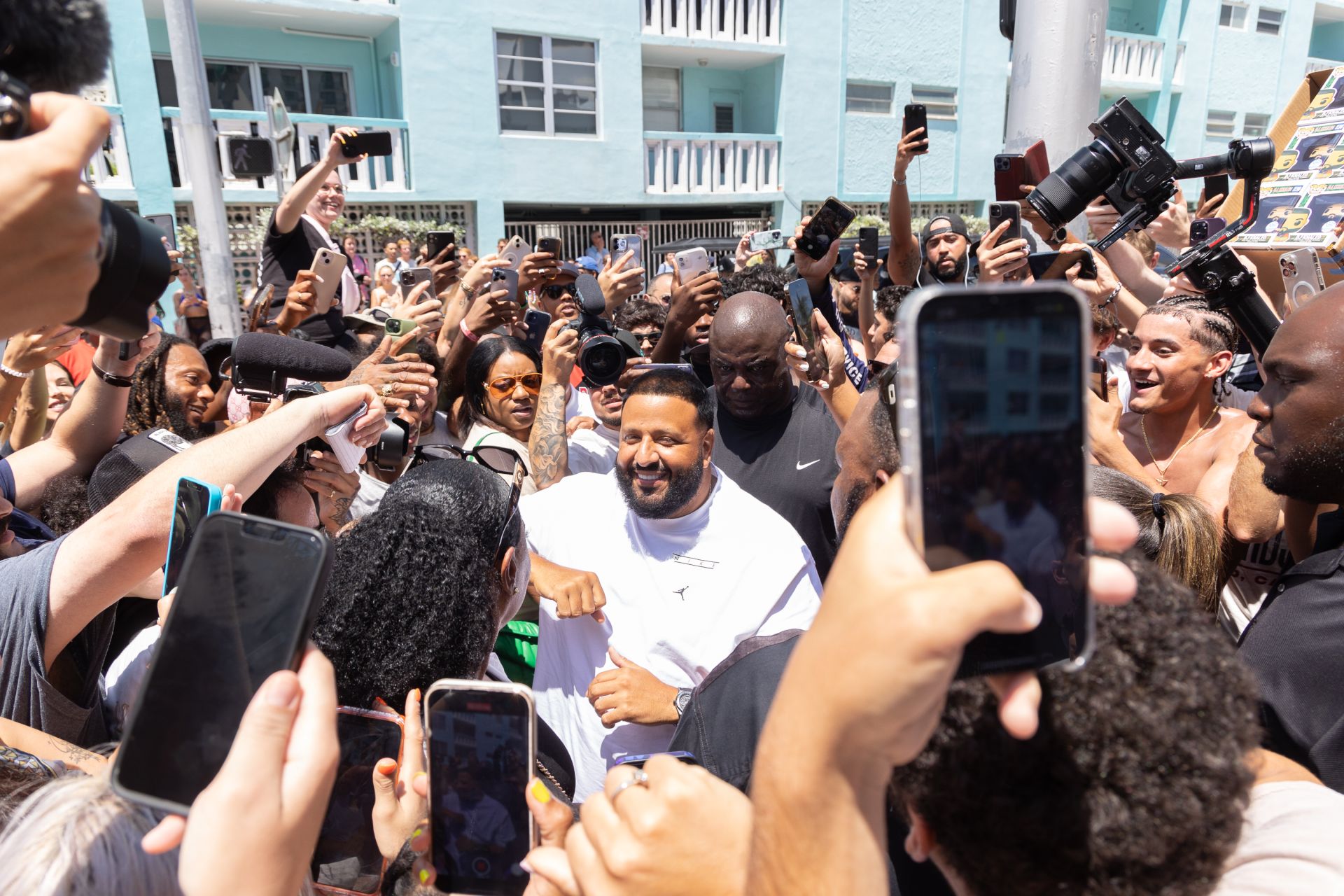Listen to this story
There is a mandatory prerequisite that young Palestinians must bear in mind when developing a new celebrity crush or obsession with a performer. This is typically satisfied with a Google search: “[Insert celebrity name] Palestine.” Even at 11 years old, when my identity was just beginning to solidify, I understood that being Palestinian inherently means embodying a political statement that is different from any other affixed identity. Although I probably couldn’t explain the complexities of identities at the time, the essence of what I was asking was simple: Would this celebrity like me? Or do they think, as many others seem to express unreservedly, that I don’t exist?
If, on rare occasions, I did come upon a celebrity who had been open about their support for Palestine, that figure would forever be enshrined as a hero. They became not just allies, but emblems. Their words of support — like Diego Maradona’s “In my heart, I’m a Palestinian,” or Anthony Bourdain’s “Today, nearly everything is made in China. Except for courage. Courage is made in Palestine” — became gospel, documented and preserved in Arab families’ WhatsApp group chats all over the world.
The root of this idolization came from knowing that being an ally of the Palestinian cause was never without sacrifice. Whether it was Marc Lamont Hill losing his job at CNN for advocating for “a free Palestine from the river to the sea,” or, more recently, Oscar-winning veteran Hollywood actor Susan Sarandon getting dropped by her talent agency for expressing a similar sentiment, there has been a clear message in Western media: Any form of public support for Palestine potentially comes with a cost. This cost, of course, is minute compared to that borne by those in Gaza today, and in Palestine more generally. As those who seek to use their voices for Palestine worry about losing their jobs or tarnishing their reputations, there are upward of 1 million people who do not even have the time to dwell on all that they have lost — a limb, a child, a home, an entire family — as they struggle to survive the ongoing bombardment and raids during a man-made famine. But even as the war in Gaza continues into its seventh month, the issue of celebrity solidarity remains an integral part of public consciousness and debate in Western societies, where it is ever-present on university campuses, on social media and even at the Academy Awards.
Due to decades of Palestinian underrepresentation, there are only a handful of Palestinians who can advocate alongside non-Palestinians and Arabs on behalf of their own cause in the entertainment industry. Before ideas of “representation” took hold, Palestinians didn’t have the few household names who have since managed to overcome the hurdles of inclusion, like Mo Amer or the Hadid sisters. We only had one figure — DJ Khaled.
Khaled has, surprisingly, kept a foothold in the mainstream for almost 20 years — especially in the South — with hits that go back to the times of Akon and T-Pain in 2007, like “All I Do Is Win” and “We Takin’ Over.” His collaborations have only gotten more prestigious with time, including features with the likes of Rihanna, Justin Bieber, Jay-Z and Beyonce — whom he also spends his free time with at exclusive upper-echelon parties.
For me specifically, and for the hundreds of other little Palestinian-American kids from Mazraa al-Sharqiya in the West Bank, Khaled has always been someone to point to for proof of our ancestral village. Although it may seem small, there was always a level of excitement when we would see Khaled mention our hometown in videos or interviews. Any ounce of representation was appreciated, especially from one of our own. It led us to overlook the nature of his character, embarrassing at times — his booming voice, meme-able “motivational” abstractions and signature catchphrases — and claim him as one of our own, the same way we would for anyone in our community. But the man who is so loud his voice is heard around the world has gone selectively mute — and only on one specific topic.
Since October, social media has been flooded not only with traumatic videos of those on the ground in Gaza, but with visuals of millions in the streets of every major city in the world protesting against the ongoing bombardment. People who knew nothing about the occupation of Palestine before October 2023 have dedicated their entire platform to relaying what they’ve been learning in recent months. And amid all the noise and advocacy, Khaled has kept his distance — stirring frustration in his community.

The straw that broke the camel’s back was a recent video that showed Khaled being carried by his security guards, at his own request, to avoid getting his unreleased limited edition Air Jordans dirty. Many took to social media to convey their disapproval of the celebrity, with some even saying they “disown” him as a Palestinian. Adding fuel to the fire, a recently released video shows Khaled telling an employee, who says that a jet should be cleaned just twice a month, that he demands it is cleaned every day so that it is “glossing nonstop.” When juxtaposed with the displaced Palestinians in Gaza who are walking around their makeshift tents barefoot, starving as they search for water that is sure to be contaminated, tone deaf doesn’t even begin to describe Khaled’s latest antics.

The silence has been noticed, and reprimanded, beyond Arab and Palestinian spaces. After seeing names as big as Billie Eilish associating herself with Palestine on red carpets, many within the industry itself are wondering what could be holding Khaled back. Is it that his label, We the Best, is owned by Universal Music Group, whose executives are among the staunchest supporters of Israel, such as Haim Saban, who donated the largest sum (as of 2017) in the history of the Friends of the IDF, an Israeli military-funding charity? Is he just not interested in being associated with Palestine when it’s controversial, or is he too afraid of what it may cost him?
In a recent interview, the actor and comedian D.L. Hughley scolded Khaled, drawing attention to the Air Jordans video. “We’re used to Palestinians being carried. They’re just not alive. They’re dead and they don’t have shoes, they don’t even have feet,” Hughley said. Addressing the DJ, he went on to tell Khaled that he has gone “from DJ Khaled to DJ Callous. You cannot be so oblivious that you forget that the images that you are portraying have an equal and opposite effect. And what it tells people is that if somebody that looks like them doesn’t care, why should you?” Online, Arabic-speaking communities have given Khaled a more scatological nickname — not DJ Callous, but DJ Khara, an Arabic slang word meaning “shit.”
In Khaled’s silence lies a cautionary reminder not only of the dilemma that is at play for public figures when speaking out about Palestine, but of how status and wealth have the ability to infiltrate one’s identity — replacing some of the very elements that make that person themselves. It is not only unrealistic and foolish to expect celebrities like him to use their platforms, but it is dangerous to put so much emphasis on their public support — or lack thereof. The question shouldn’t be, “Where is DJ Khaled?” Rather, it should be: “Do Palestinians really need him?”
From his “Allah” chain to his hookah to his hit song “Arab Money,” DJ Khaled has capitalized on his Arab identity to set himself apart in the oversaturated industry that is rap and hip-hop. Additionally, Khaled has gone out of his way to ensure people know he’s specifically Palestinian. Whether it be through his interview responses, sending a Palestinian dabke dance group to Canadian rapper Drake on his birthday or his now-memed Instagram stories featuring iconic Palestinian dishes like maklouba or knafeh, Khaled has never censored the performance of his native identity. And in between these snippets of Khaled relishing the celebratory attributes of our culture, he has displayed his day-to-day life, living in his million-dollar Miami mansion, with his personal chef, brushing shoulders with some of the most powerful people in the music industry and beyond.
At the same time, whether it was a calculated choice or simply because he is not knowledgeable enough about the conflict, Khaled has never been too political when it comes to being Palestinian. In 2021 — right before tensions rose in the Palestinian Jerusalem neighborhood of Sheikh Jarrah, leading to months of conflict — Khaled spoke to British GQ about his feelings on being the most famous and high-profile Palestinian American. In the interview, he is quoted saying: “It’s incredible, because, you know, that’s what I represent: love, positivity, family, peace, happiness, prosperity, progress. I mean, just to be able to say that I’m American Palestinian, that’s so beautiful.”
Although his upbringing was in Florida, DJ Khaled was actually born in New Orleans, Louisiana — where there is a big population of Palestinians from our village. Mazraa is relatively quiet compared to the villages known for their resistance movements, like Nablus or the Jenin refugee camp. By contrast, it’s known for having a high percentage of Palestinian-American dual-citizens. Recently, though, it found itself in the limelight after Tawfiq Ajak, a 17-year-old Palestinian American, was shot in cold blood by a settler while driving home after a cookout. His father Hafiz had moved the family back only months before so they could integrate in his homeland — learn the language, the history and the customs. The family had previously lived in New Orleans — the same community that DJ Khaled was born into, and where many of his extended family members still live today. And yet DJ Khaled said nothing.
Palestinians from my village have joined the masses in “canceling” Khaled, including his own family members. In an interview, a cousin of Khaled’s, Fadie Musallat (DJ Fadie), said that he recently cut ties with Khaled over his silence: “There’s no excuse when you’re actually a Palestinian. My mother lives there, we’re from the same village, same family. There’s no excuse.”
While many wait for Khaled to eventually break the silence, a majority have come to terms with him being a lost cause, and are urging others to make him insignificant. In a viral TikTok published only one month after the war began, Palestinian-American rapper Anees tells his Palestinian audience that they do not need DJ Khaled to speak up about Palestine anymore. “We’re mainstream, habibi. White kids on TikTok are posting about it. Everybody is talking about Palestinian liberation and the decolonization of Palestine. We don’t need DJ Khaled to speak up anymore.”
Although those in the diaspora may feel disappointed in DJ Khaled, Anees’ argument has proven itself true after an additional five months of silence – Khaled’s silence has not hindered the pro-Palestinian movement in any way. And many questions arise from this: Do Palestinians need someone who can’t pronounce the word baklava correctly to advocate on their behalf in the West? Is it worth the diaspora’s energy — which has dwindled after months of watching children with burned, dismembered bodies crying for their deceased parents — begging DJ Khaled to do something?
The public has seen what happens when a celebrity who is silent is pressured into speaking with the terrifying AI-like video of Mo Salah robotically “pleading” for leaders to let aid into the Gaza Strip. After days of the international Muslim community asking Salah where he was, there was a collective dissatisfaction when he answered their call, even though he technically delivered what was asked of him. Those who were begging for his public support found that the issue wasn’t that he hadn’t said anything — it’s that it wasn’t instinctual for him to say anything in the first place. Retrospectively, Salah’s continued silence may have been better than seeing his lifeless words of support.
At any rate, celebrity solidarity may be losing its purpose in an age of social media where the victims of the conflict themselves have cameras and voices. As the war in Gaza continues, it feels as though there is a collective shift in consumer consciousness. People are now asking where their money’s going, what their local politicians are doing with their influence and whether the people that they idolize are worthy of it. Specifically for Arab celebrities both in the West and the Middle East, there is a growing question about what is expected from their representation on global platforms. Is it enough for the Arab diaspora to see themselves among the elites of the West, or is advocacy for their native countries a necessary condition? In an era when attention is a form of currency, maybe all individuals can do is be selective with where they expend their “money.” What is a better use of one’s time if the intention is to make a difference for those who are suffering on the ground: urging someone with a voice to use it against their will, or breathing life into the voiceless?
As we wrestle with the paradox of applauding public figures who are using their platforms while simultaneously deconstructing the system that gives them their power, it is still valid that many feel offended by Khaled’s behavior. There is a clear irony in Khaled trumpeting his Arabness when it earns him viewers and virality on social media, but feeling disinclined to talk about a cause that is animating the entire region and is leading to the destruction of his supposed home; if there is any profit from performing an identity, it is not baseless to expect that identity to continue to be performed when it is under threat. Whether he is inclined to stay silent or feels restrained, the message being conveyed to Khaled’s own community is that his use of his identity has primarily aimed to be digestible in the West, not to offer representation of Palestinians and their struggles.
As time goes on, the truth about celebrity solidarity is becoming clearer: It is a means to an end. Genuine solidarity, especially when followed with backlash, is still a courageous, admirable act — but this is not the time of Maradona or Bourdain. We no longer have to lionize celebrities who use their platforms now that authentic Palestinian voices — coming from within the shaking walls of targeted hospitals or the rubble of their homes — can not only speak on their own behalf, but can attain the same reach.
“Spotlight” is a newsletter about underreported cultural trends and news from around the world, emailed to subscribers twice a week. Sign up here.



